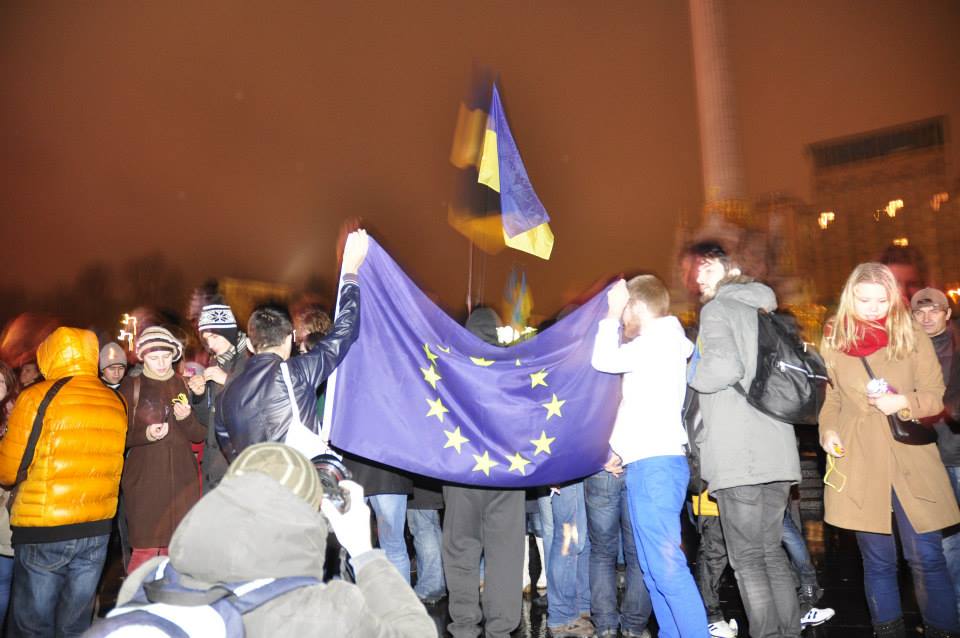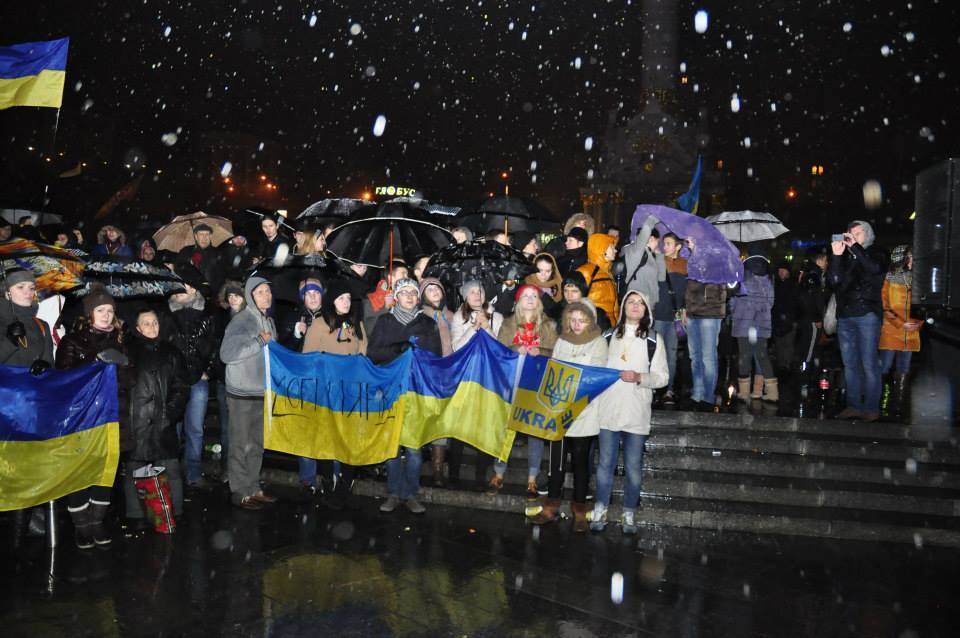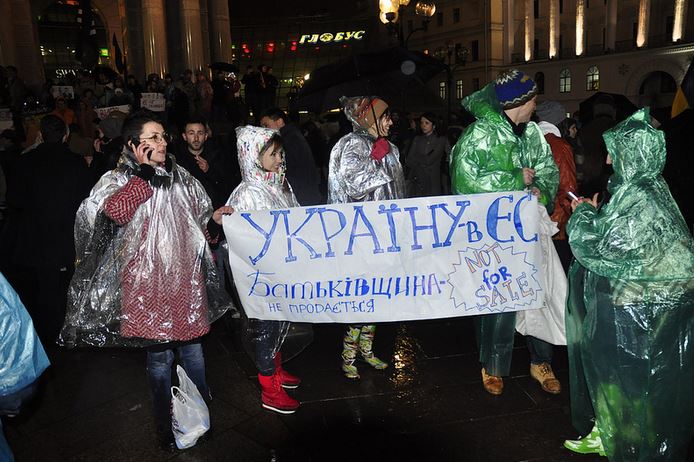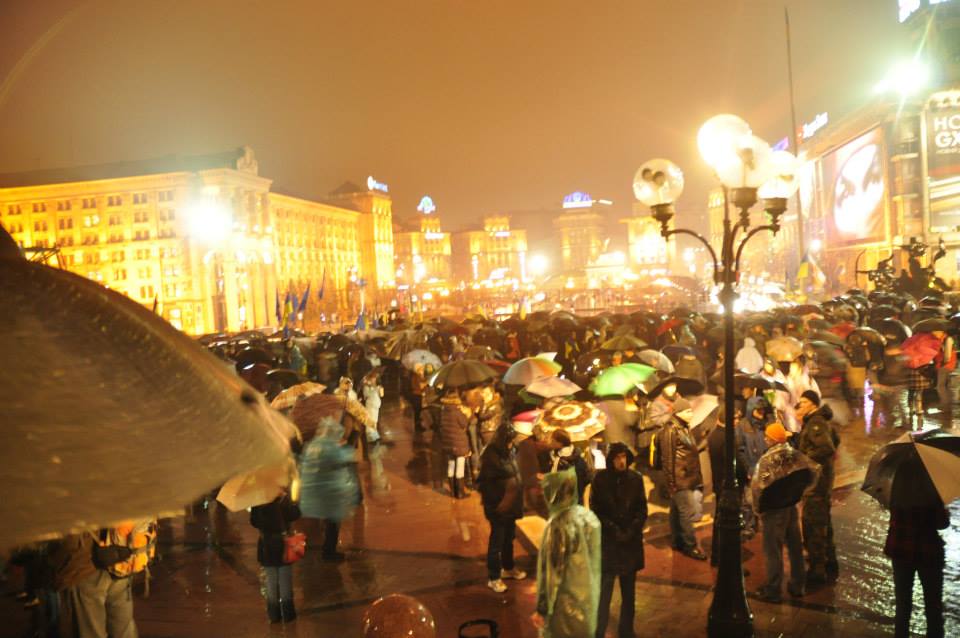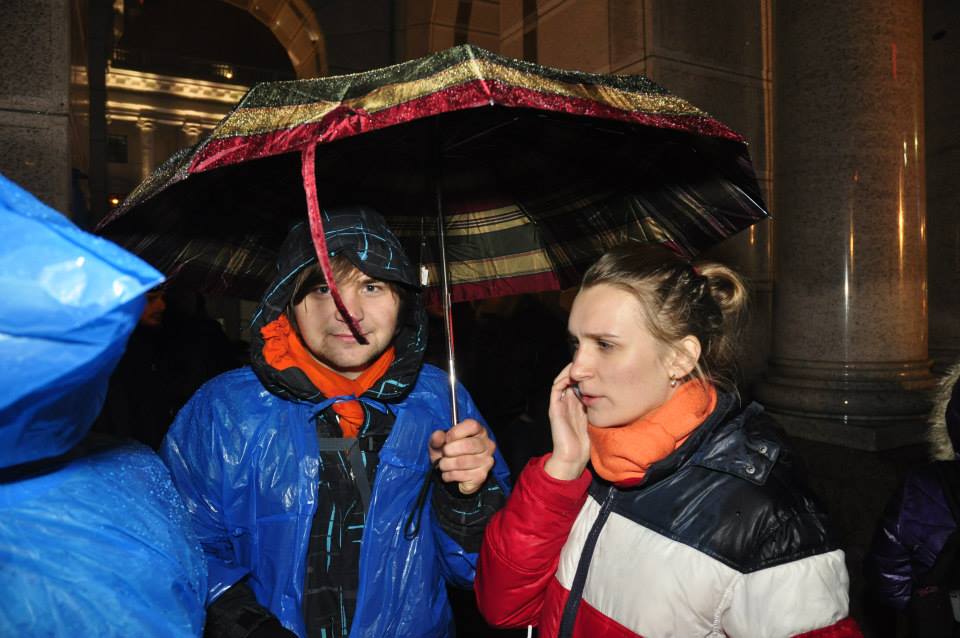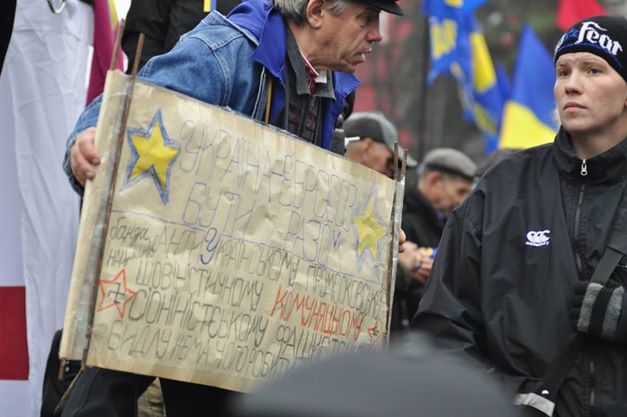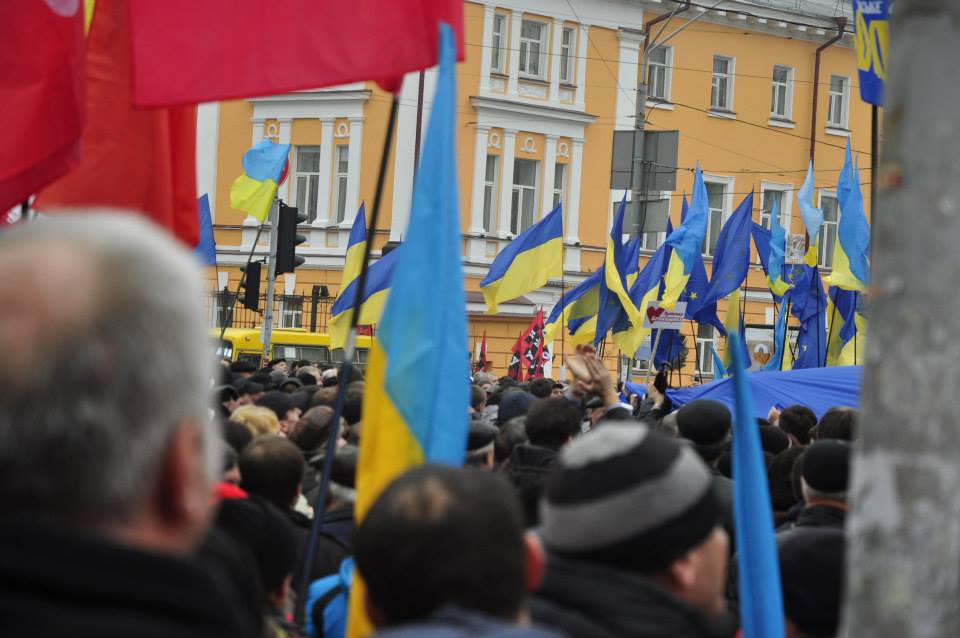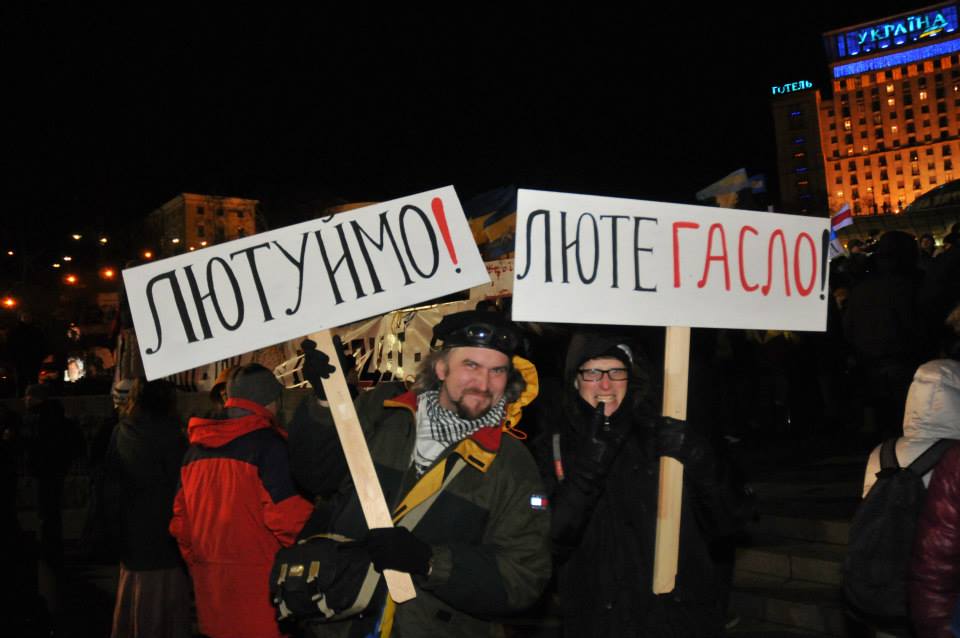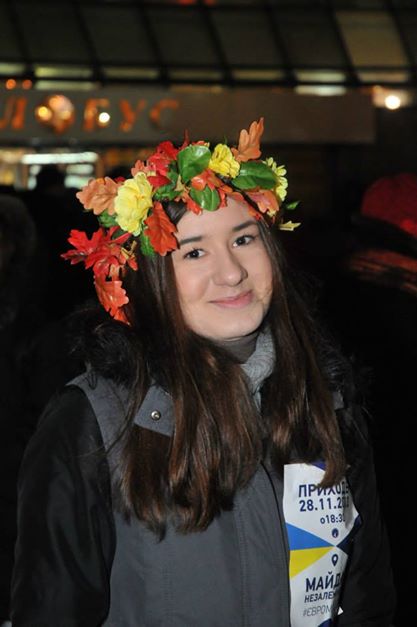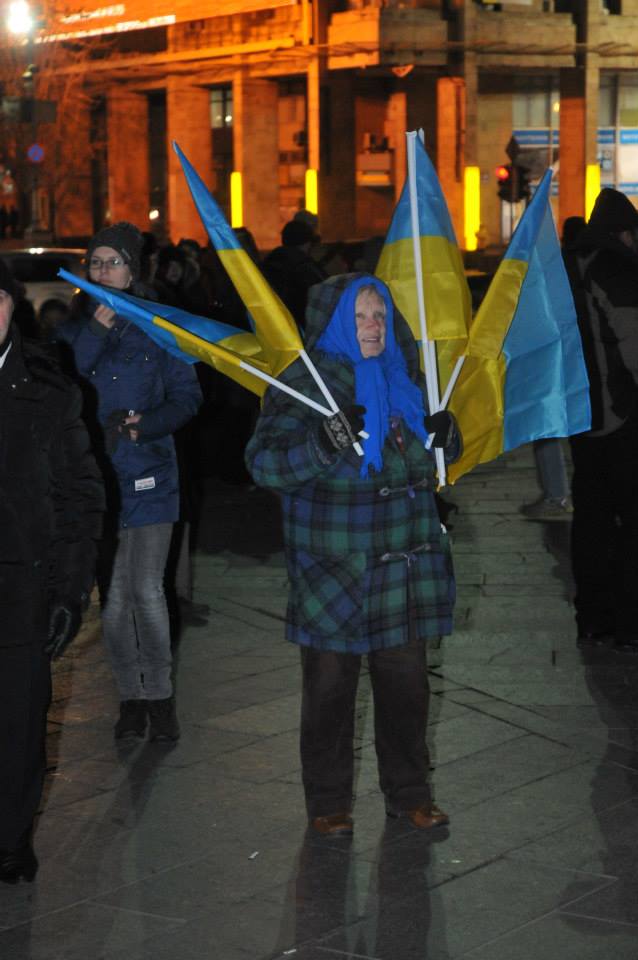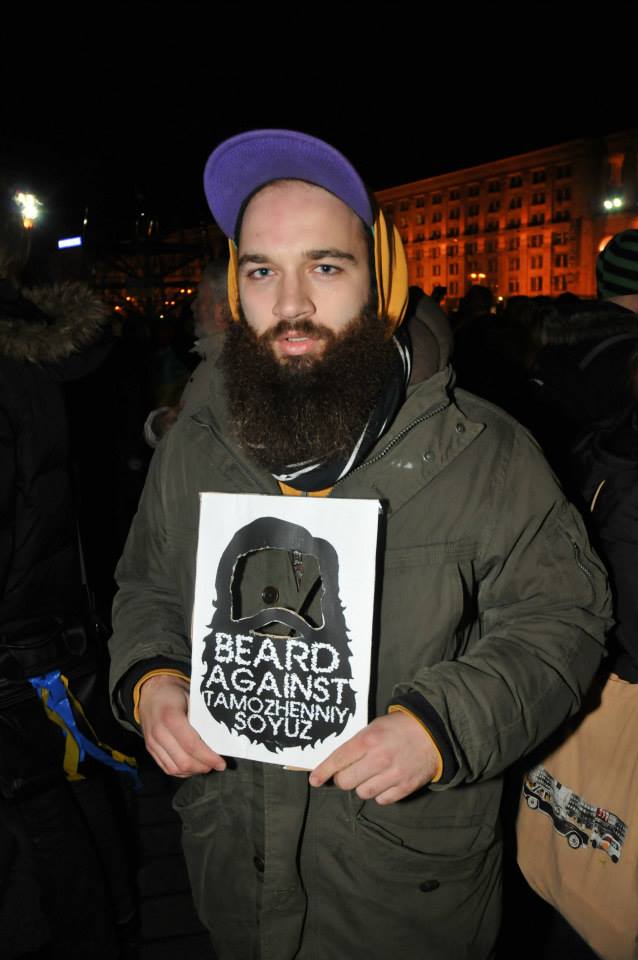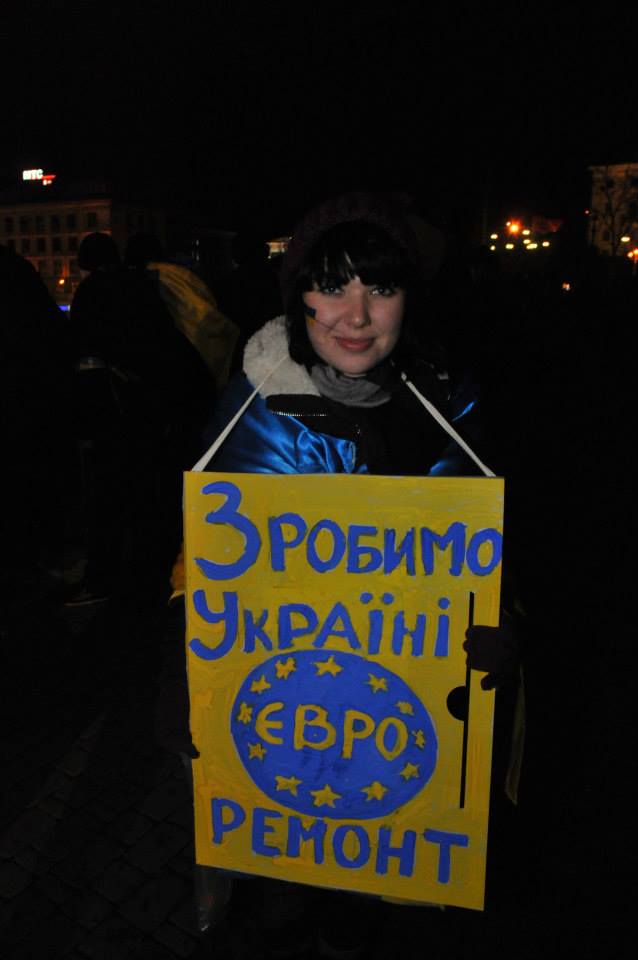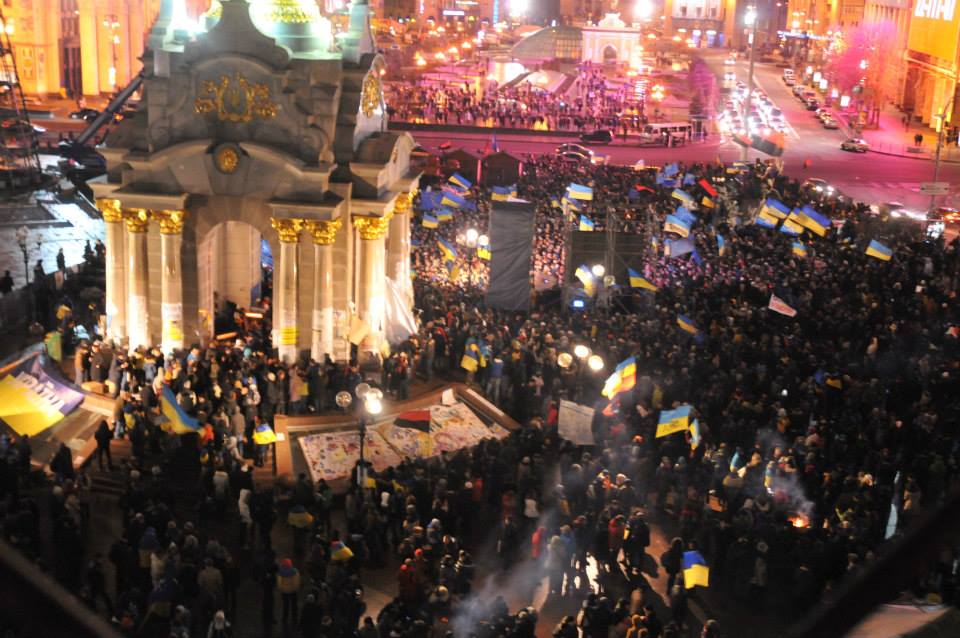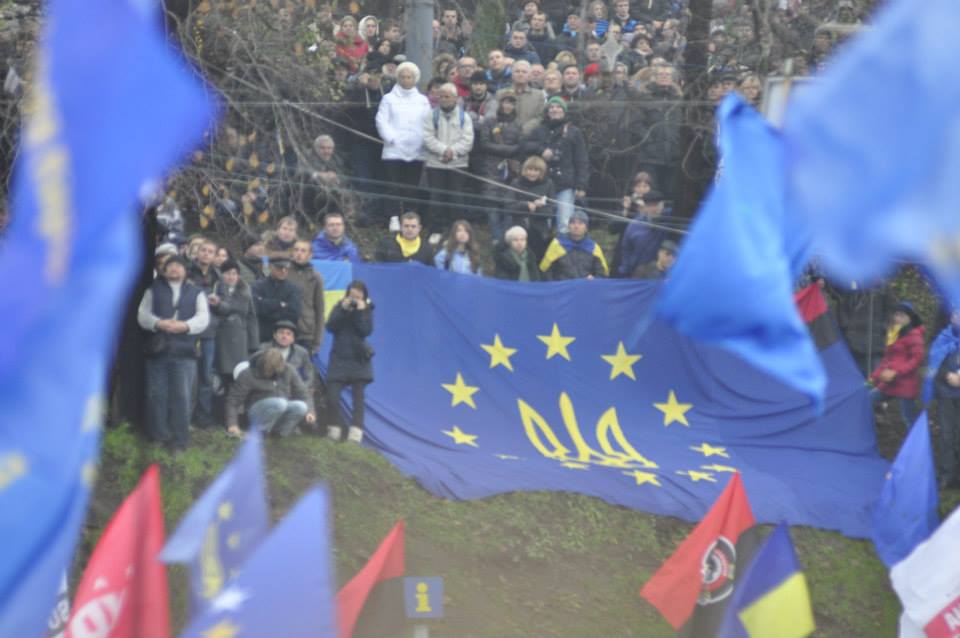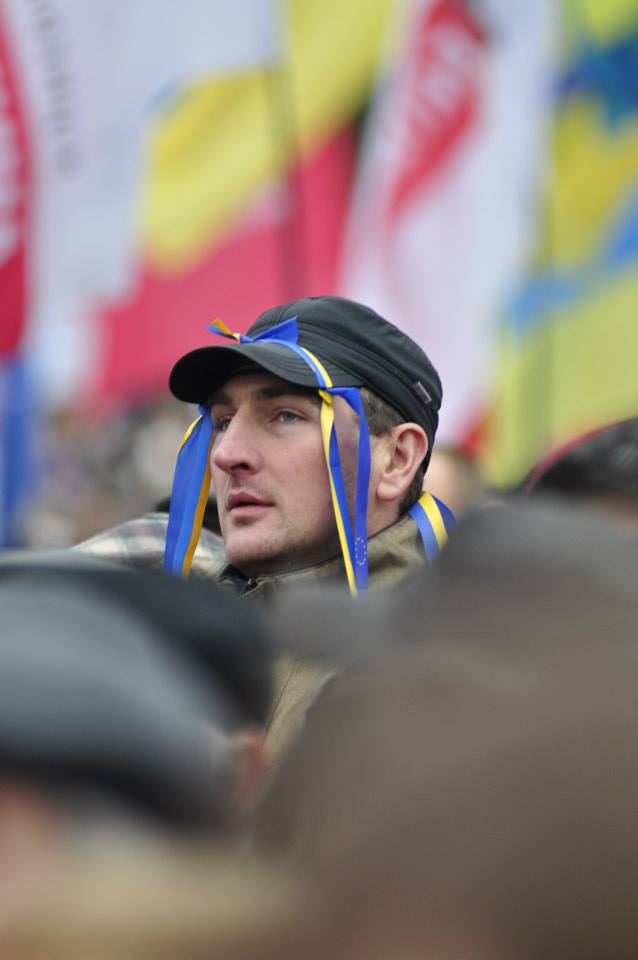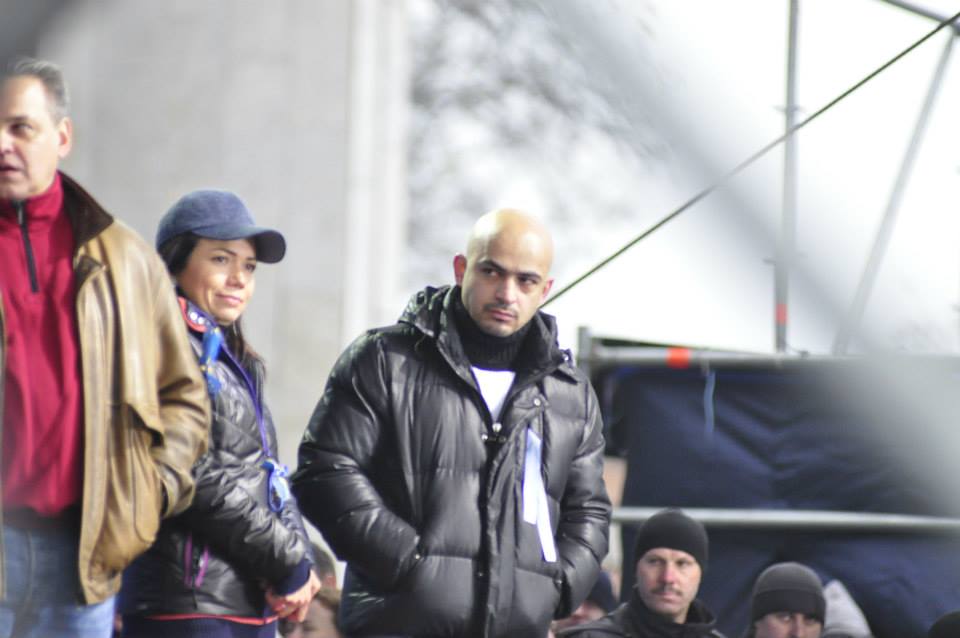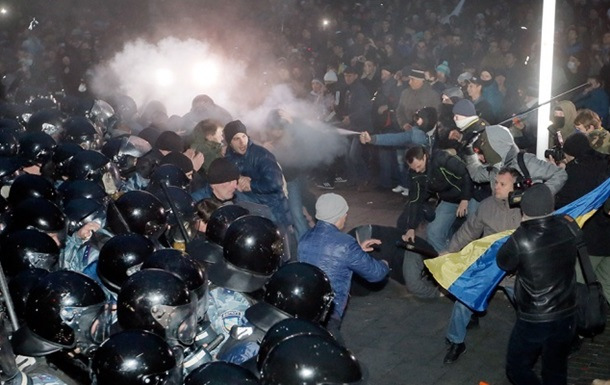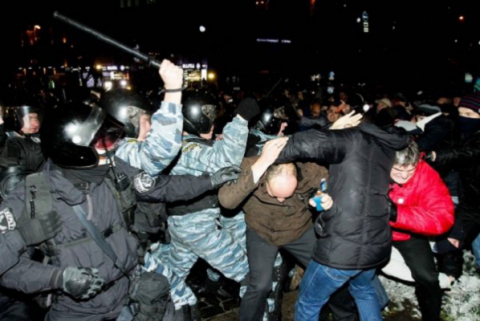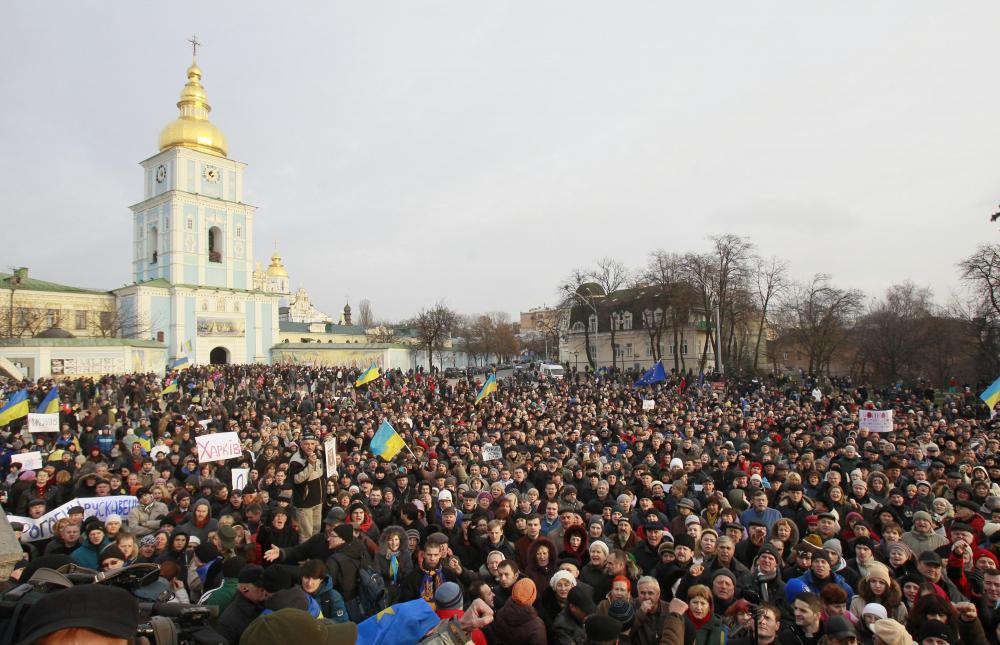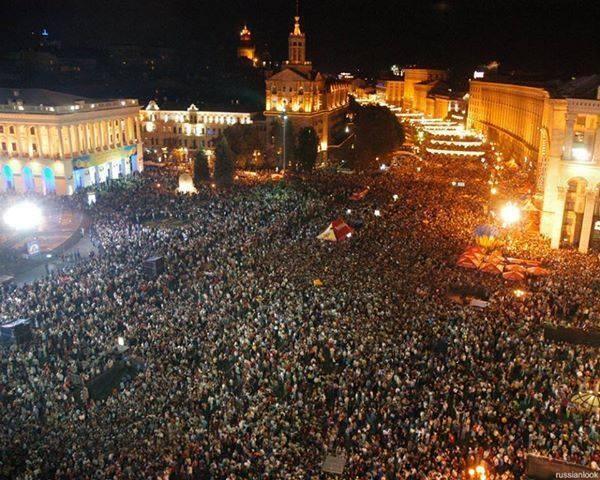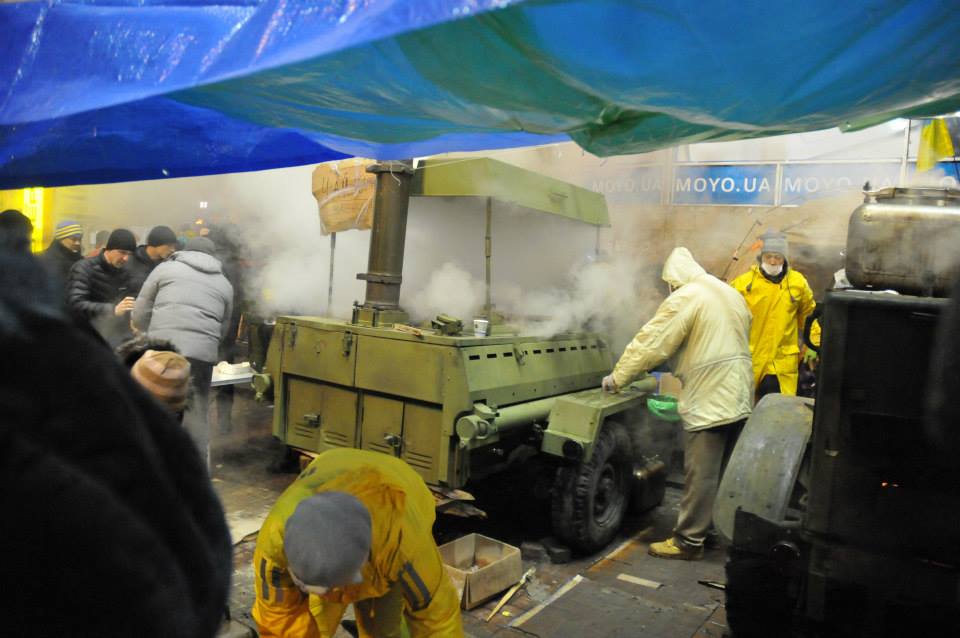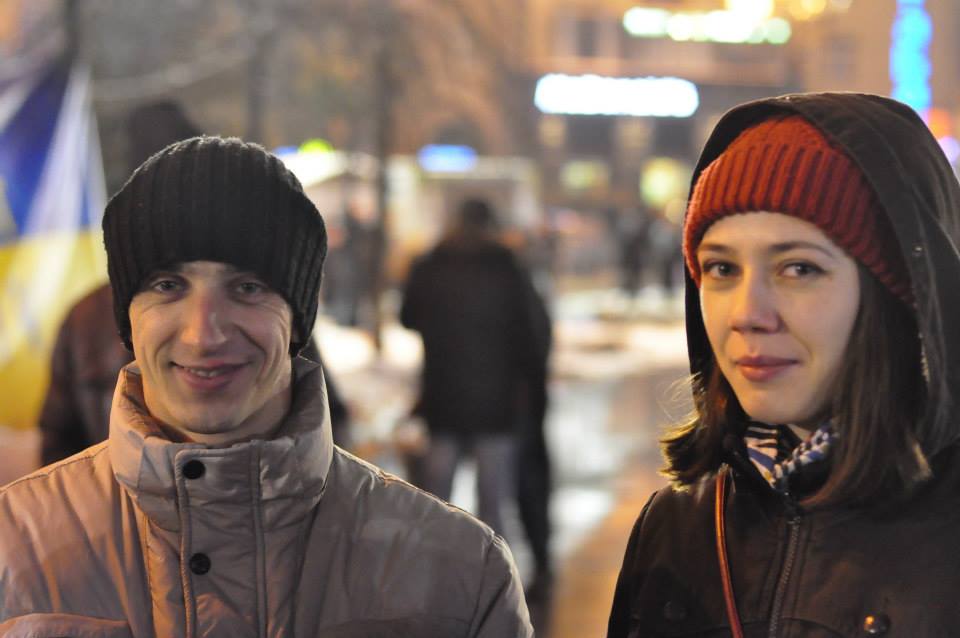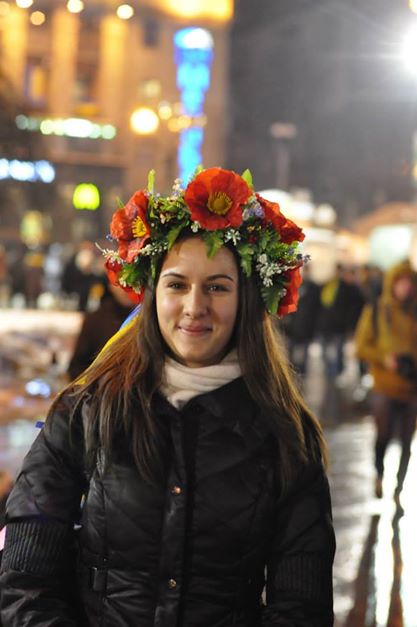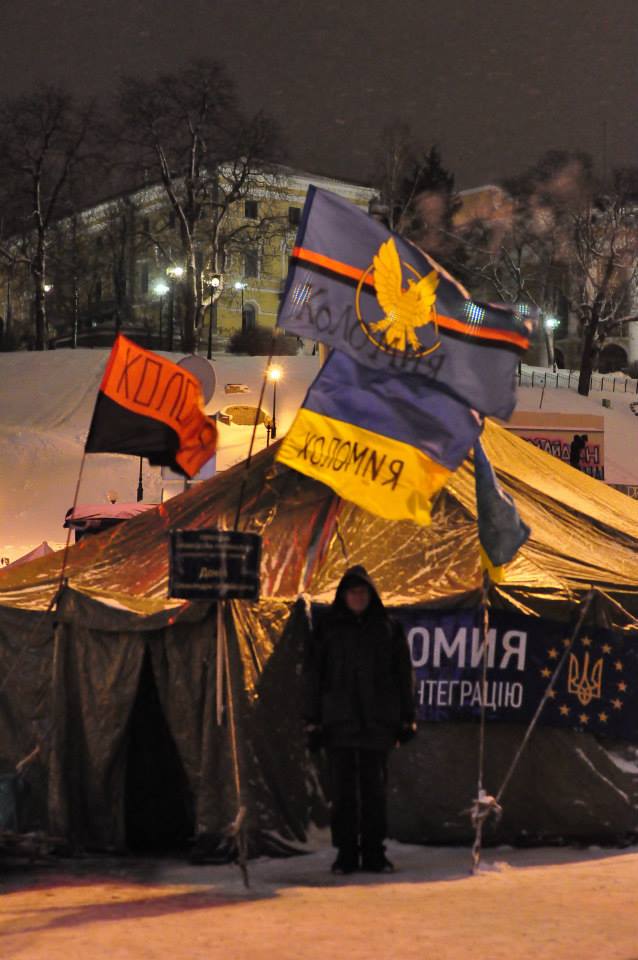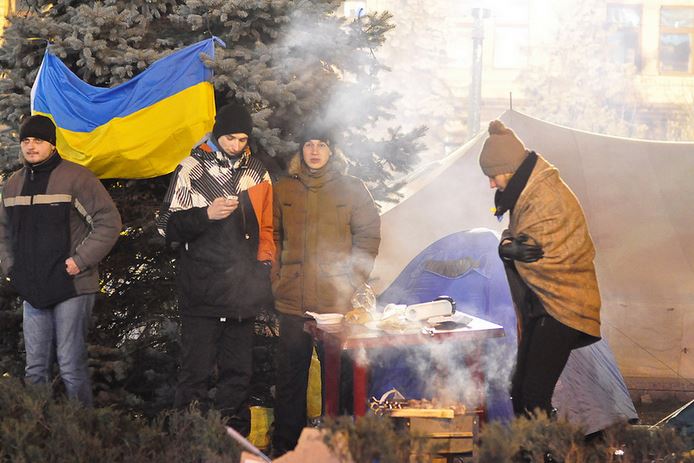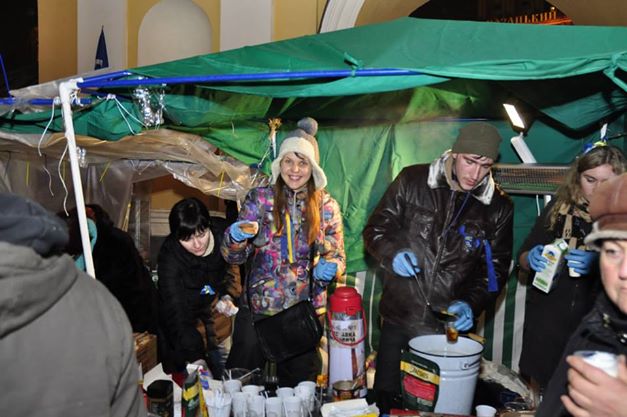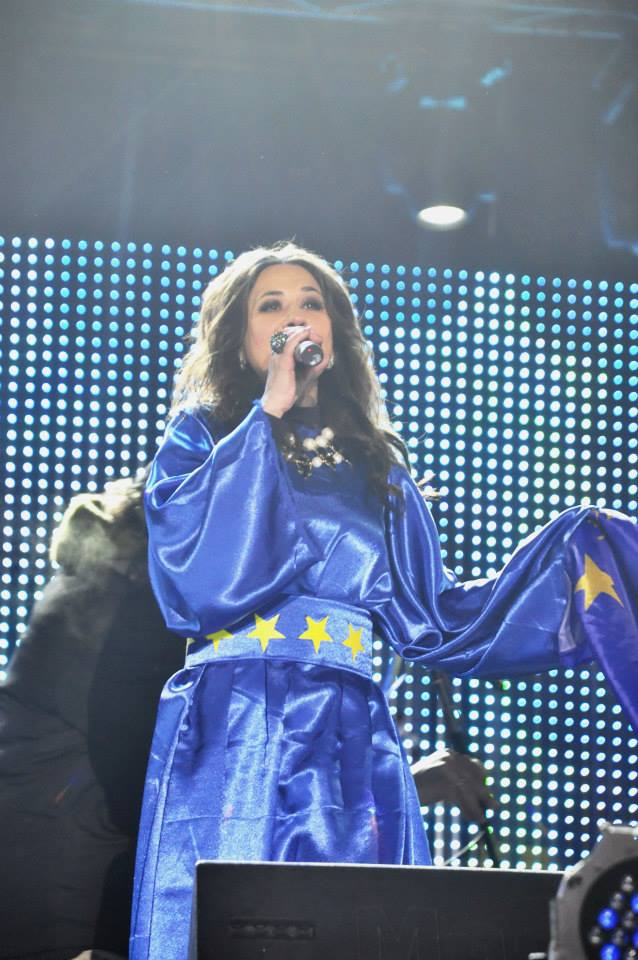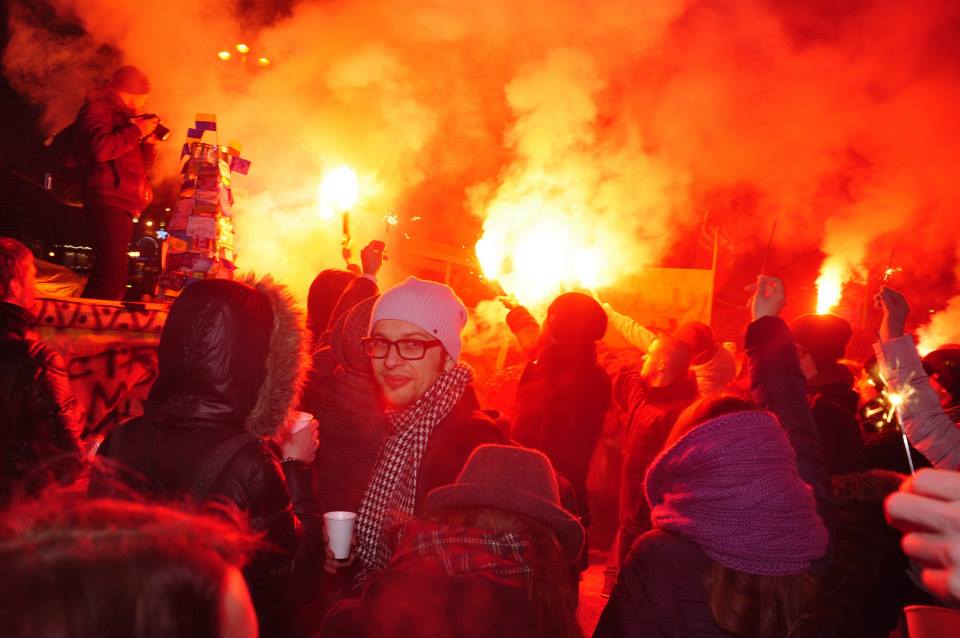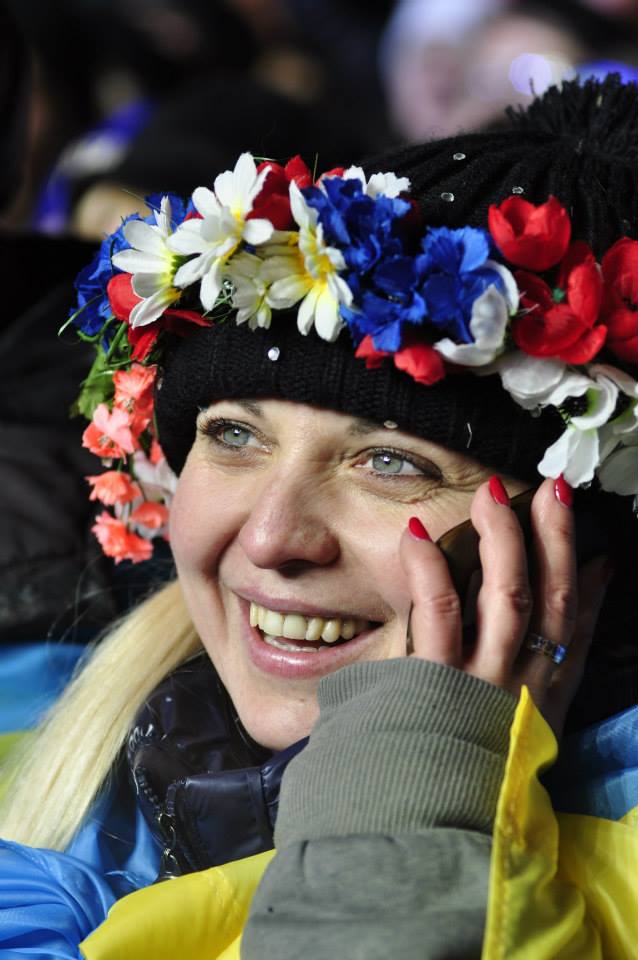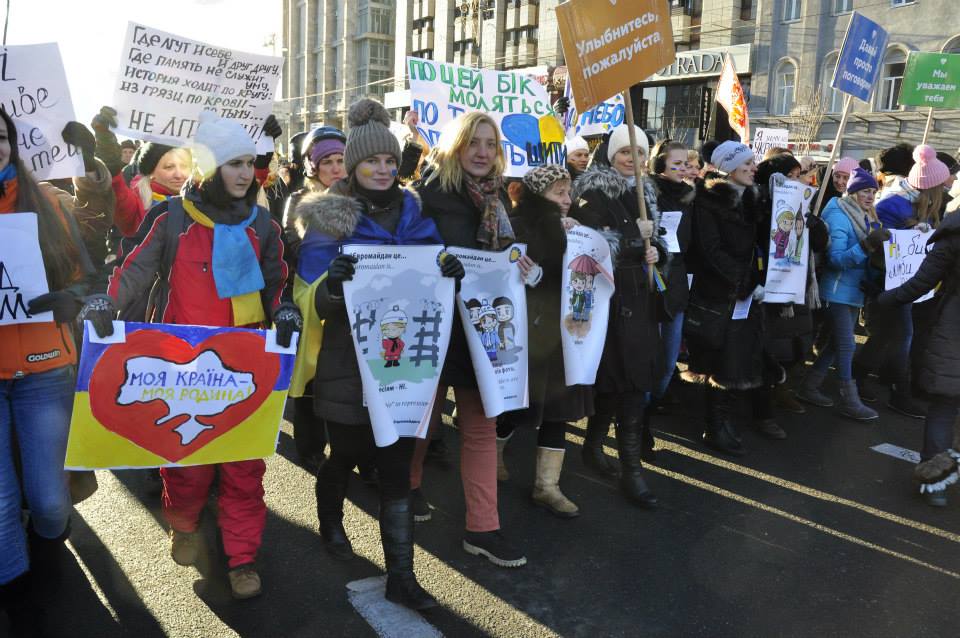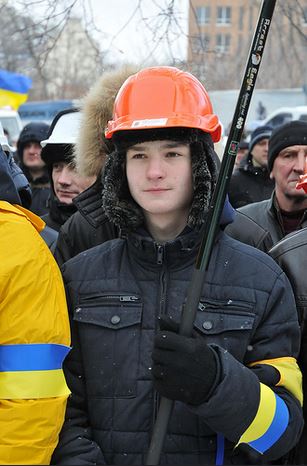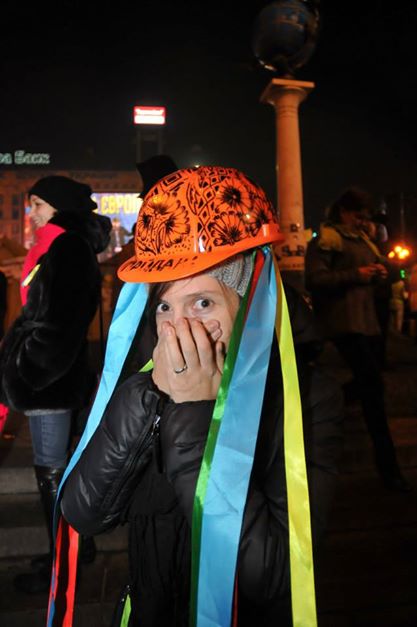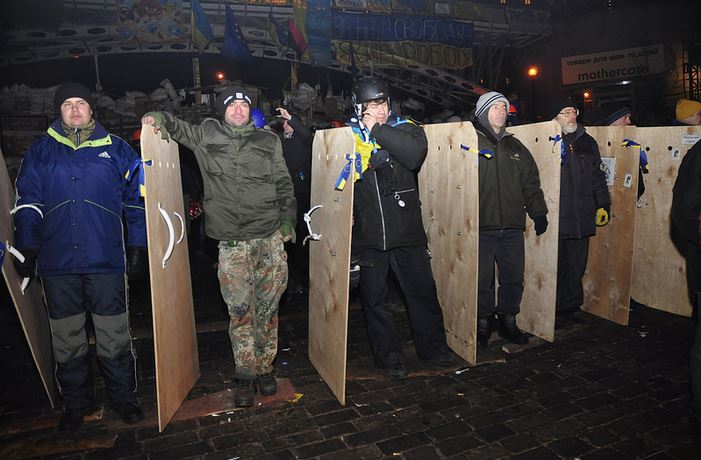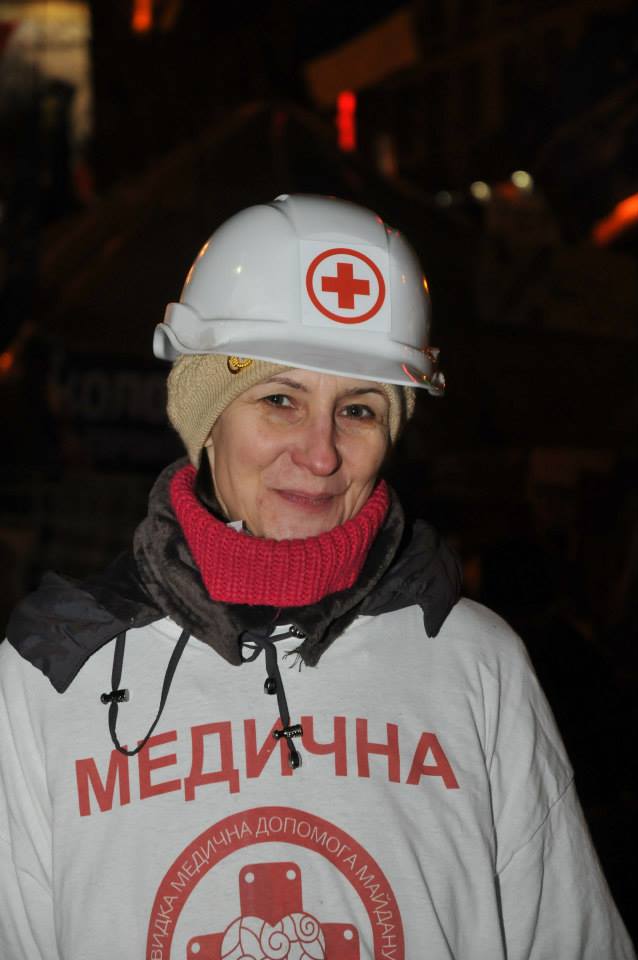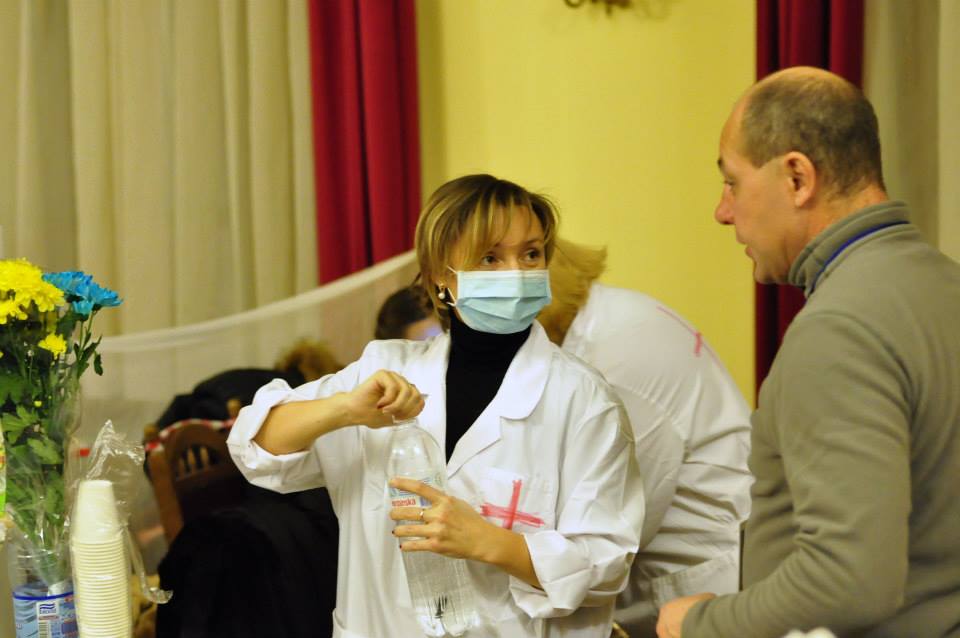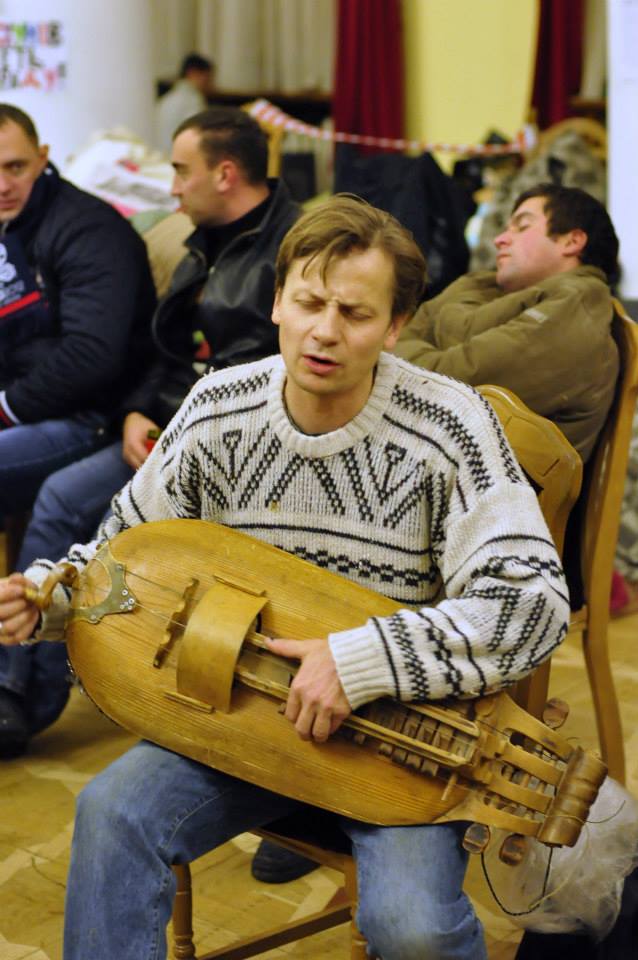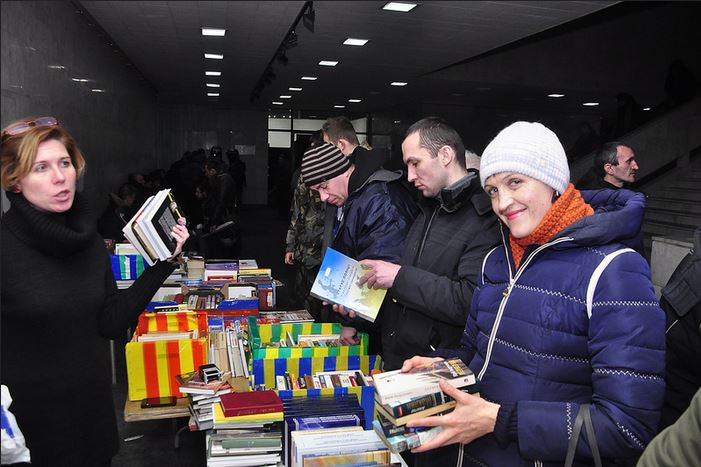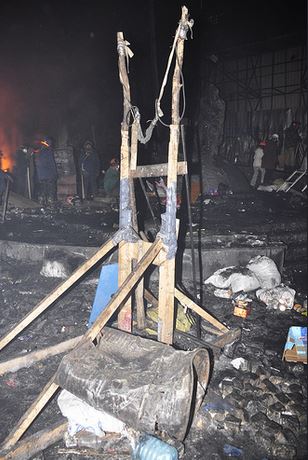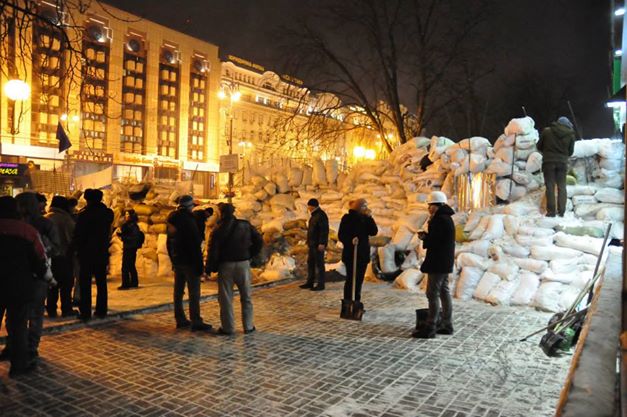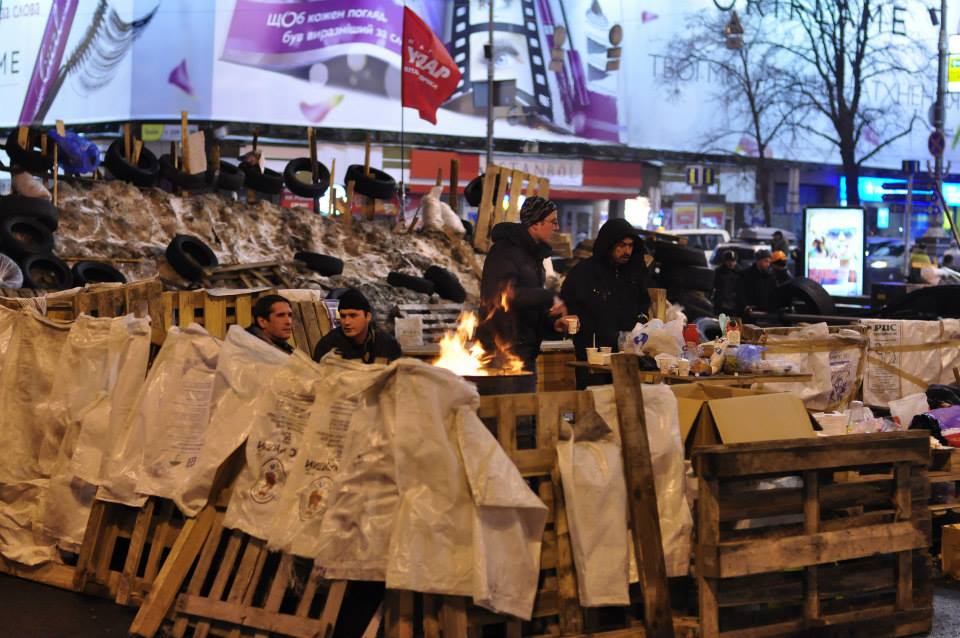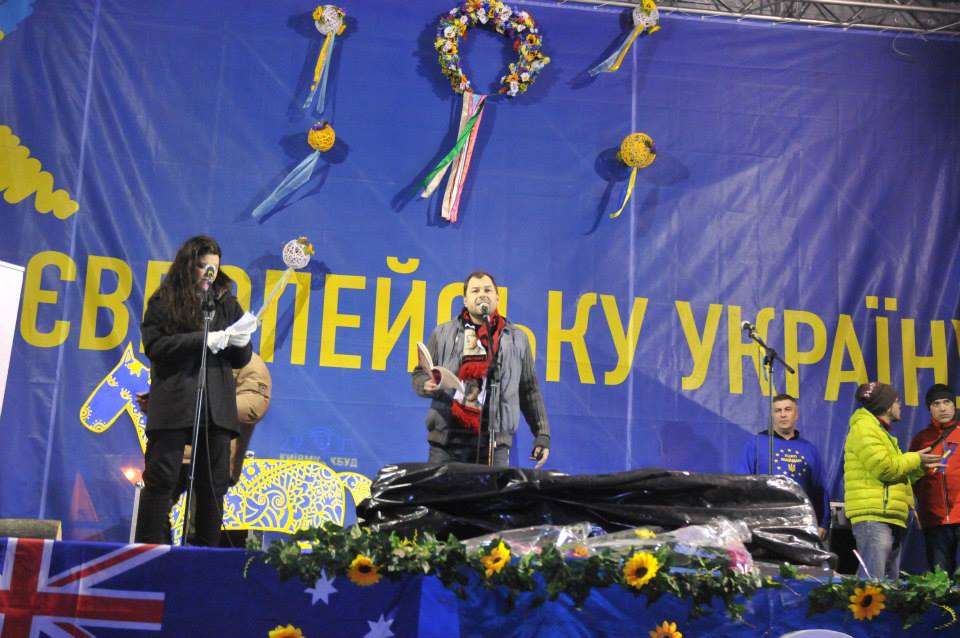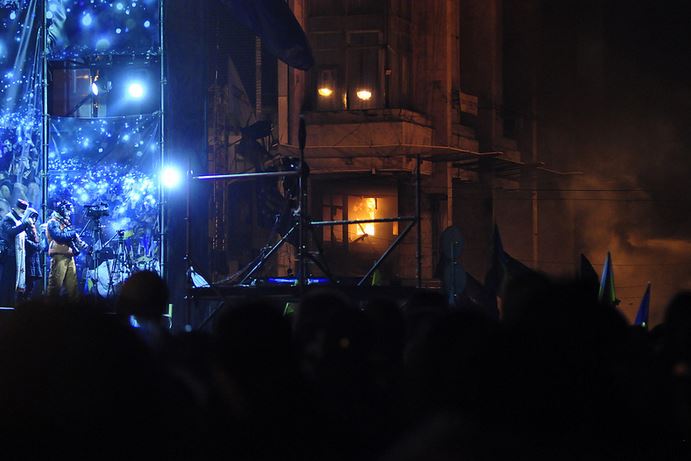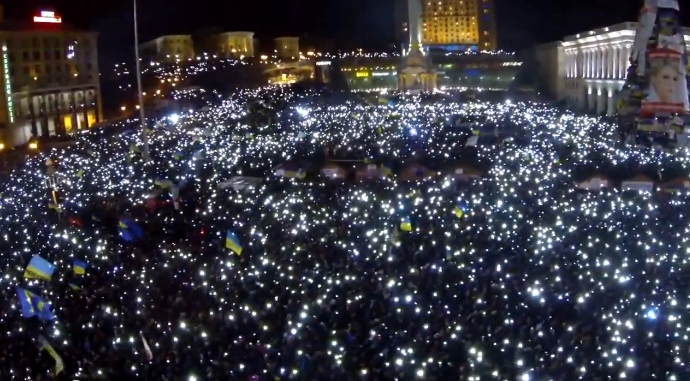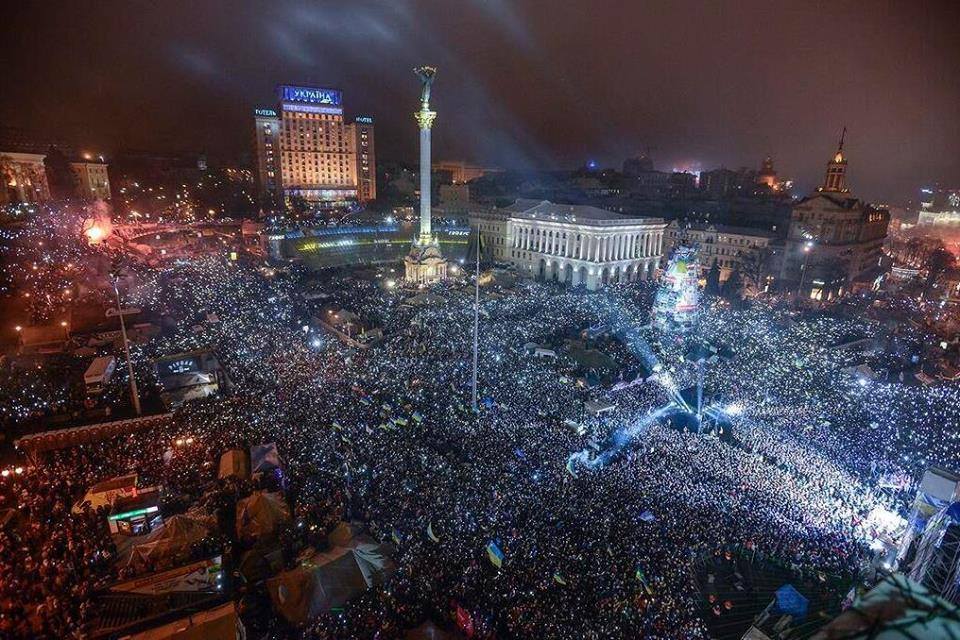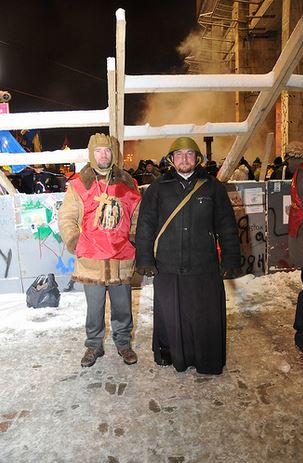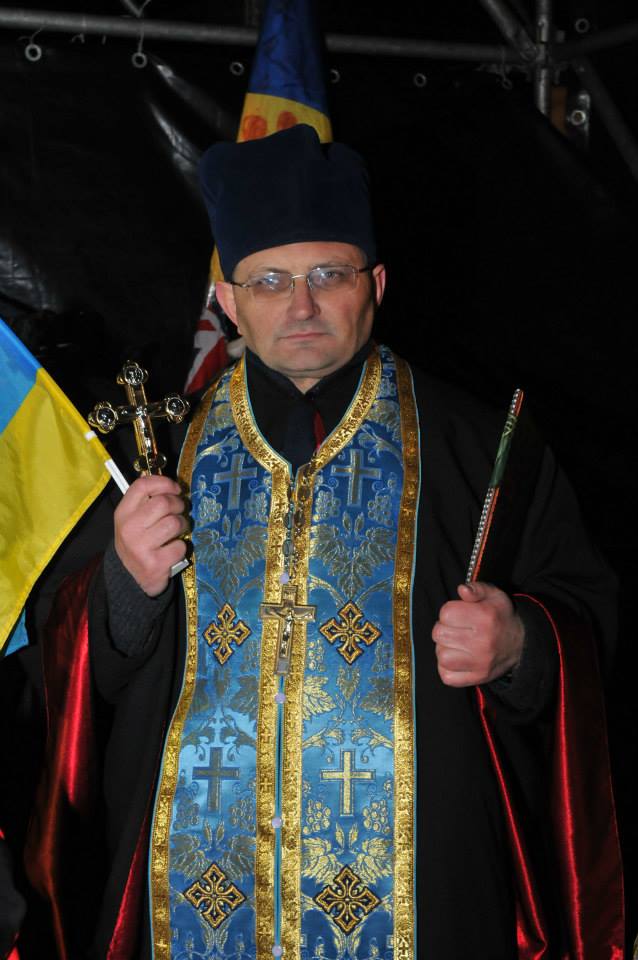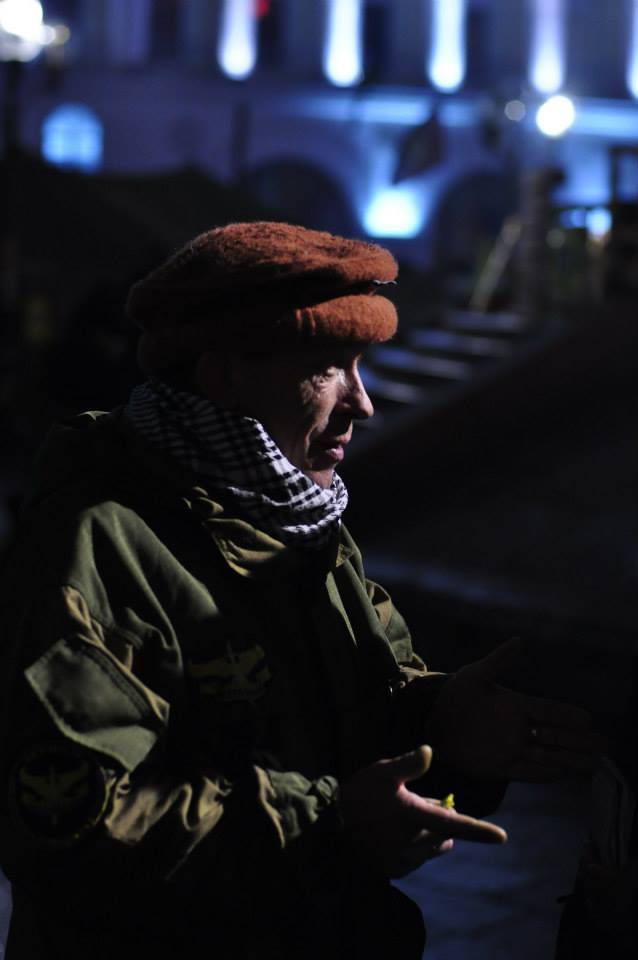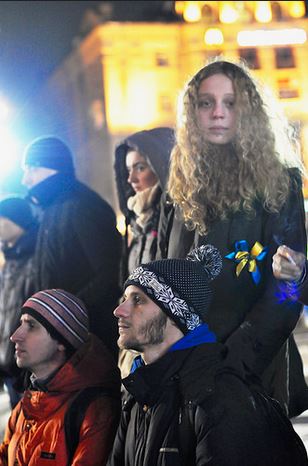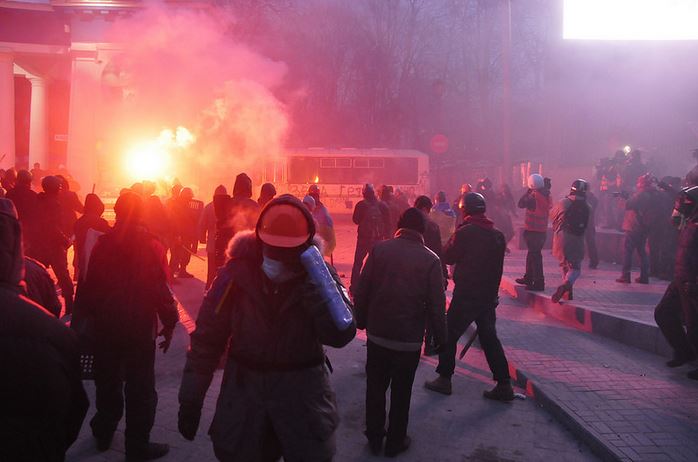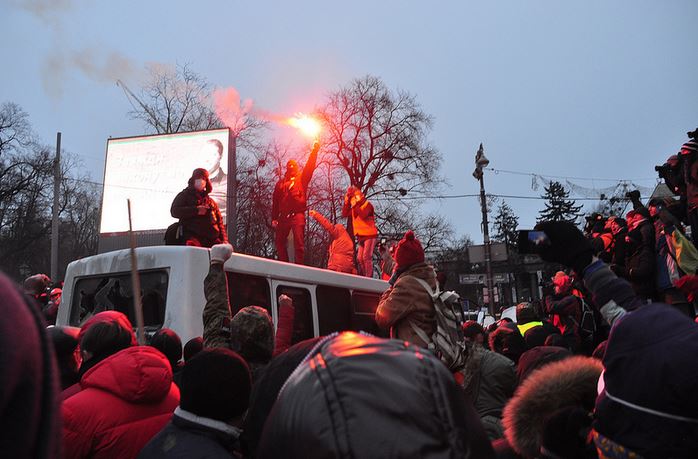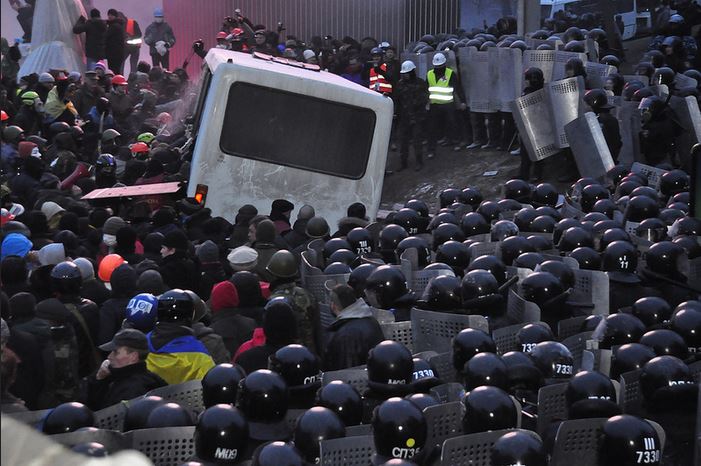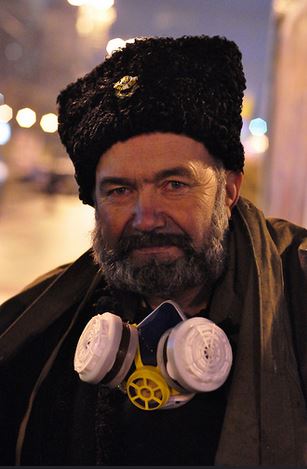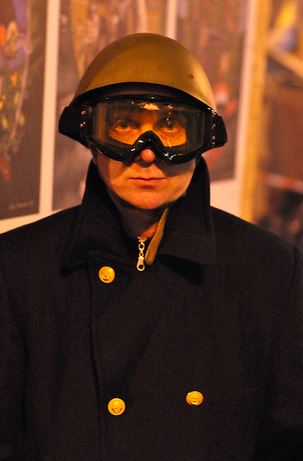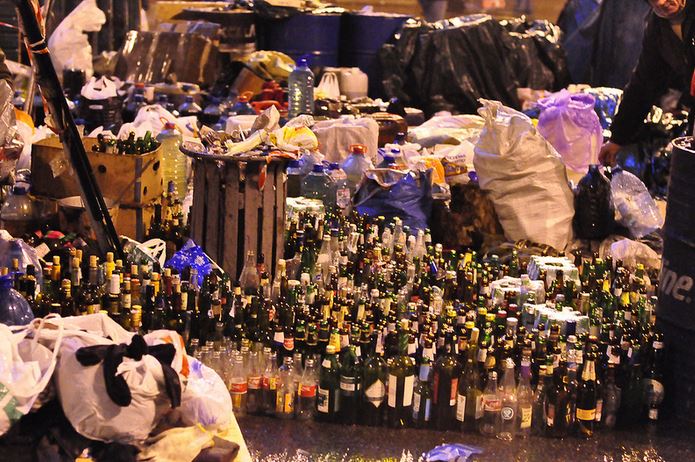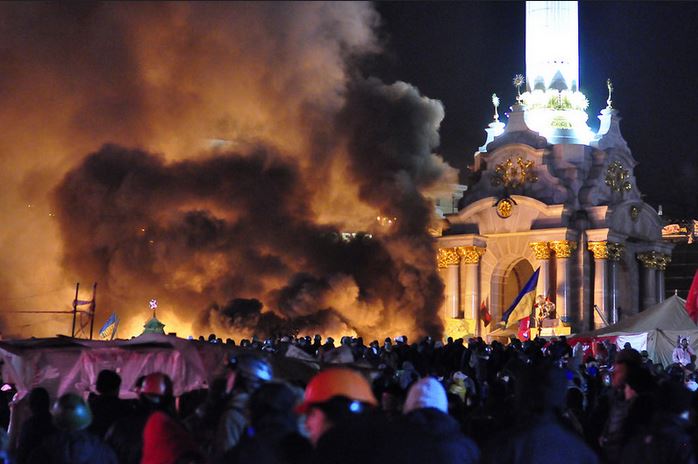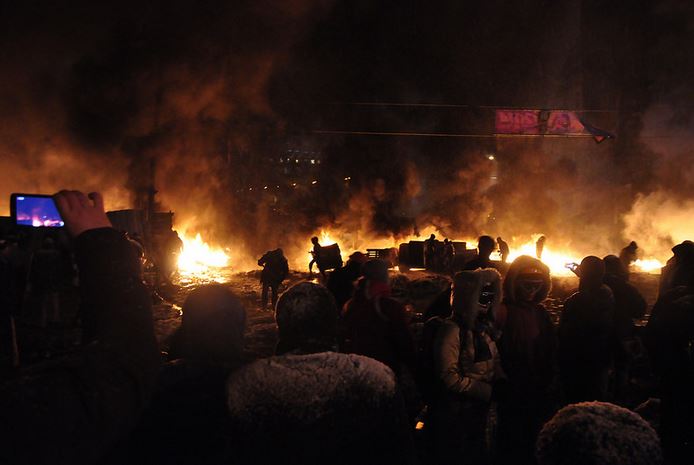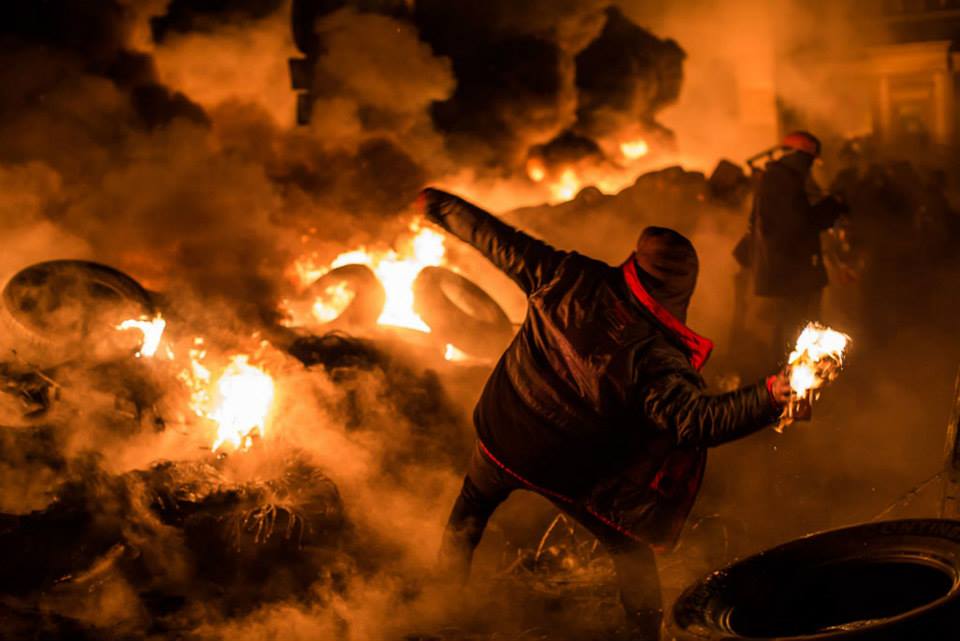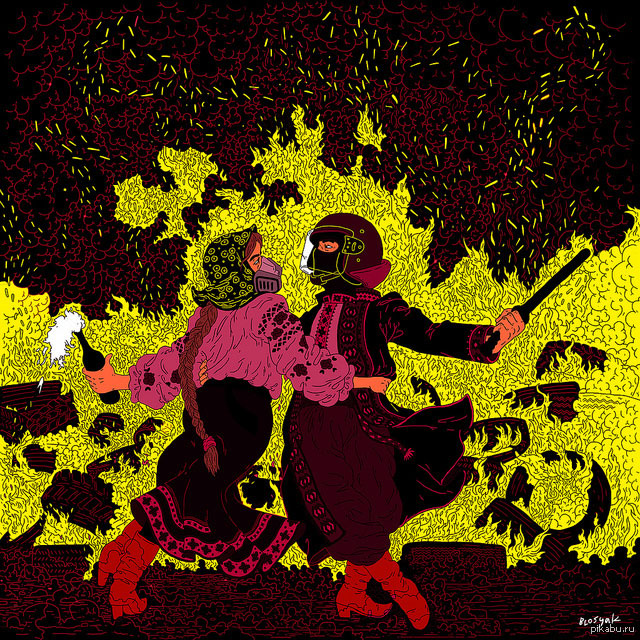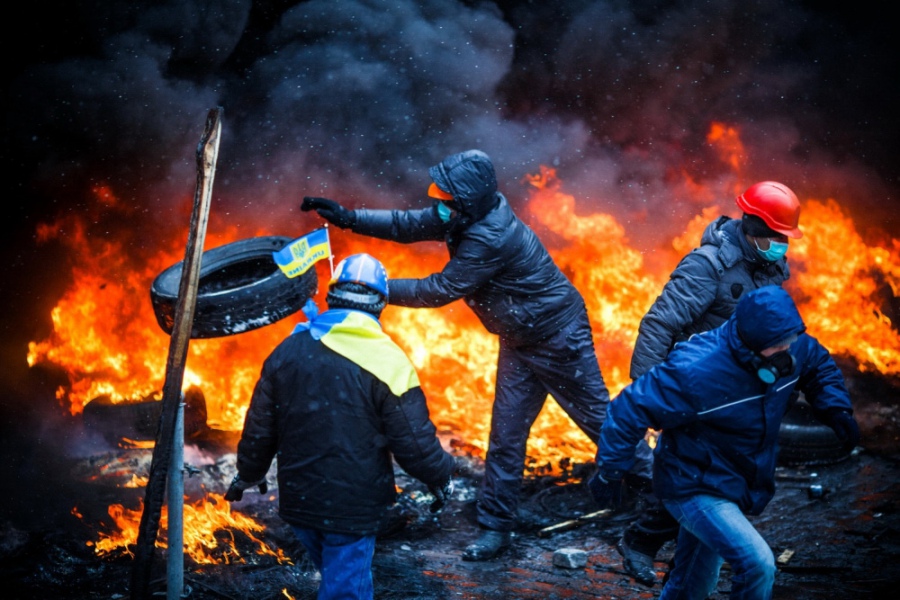On November 21, the journalist Mustafa Nayem called in facebook for people to gather to protest against the decision of Yanukovych's government back then to suspend the preparations for the signing of the Ukraine-European Union Association Agreement. We saw it as giving up on Ukraine's European dream . We came to Maidan and stayed through the night, bringing Ukrainian and EU flags. Memories of the 2004 Orange Revolution that erupted against the same Yanukovych falsifying Presidential elections back then were in the air. The Orange Revolution succeeded in canceling the fraud elections and getting pro-European Viktor Yushchenko to power only to have him replaced by the very same Yanukovych in 2010.
. We came to Maidan and stayed through the night, bringing Ukrainian and EU flags. Memories of the 2004 Orange Revolution that erupted against the same Yanukovych falsifying Presidential elections back then were in the air. The Orange Revolution succeeded in canceling the fraud elections and getting pro-European Viktor Yushchenko to power only to have him replaced by the very same Yanukovych in 2010.
The protests grew. During the years that Yanukovych was in power, Ukraine underwent a mass curtailing of civic liberties and saw an unprecedented growth of corruption. The country's wealth and assets were privatized by Yanukovych's so-called "family," your business could be taken away from you, the police could get away with killings and rapes, there was no sign of the rule of law, and corrupt officials could get away with any sort of crime.
As Viktor Yadukha so aptly put it
, because "only Dante could live up to describing the social hell Ukrainians are living in."
Ukrainians were fed up with this life. They came to Maidan to express their protest. Even though it wasn't clear what could be done to change life in Ukraine, we were certain that something must be done, and this is the time for it to happen. That's why we didn't go away.
The blue and yellow colors of the Ukrainian flag became the symbols of our desire for freedom and justice, and the determination to win them.
At 4 AM on November 30, the Berkut riot police violently dispersed the protesters. The city administration explained the dispersal by the need to erect the traditional Christmas tree on Kyiv's main square and make a skating ring around it. Escaping the beatings, the protesters fled to the Mykhailivskyi monastery.
The following morning, outraged Ukrainians came to Kyiv from all over Ukraine. We were appalled at the violence with which the police treated the peaceful protesters, most of which were students, and with the dispersal of a peaceful protest. The Euromaidan revolution, apart from the desire to have a better life and have Ukraine sign the EU Association agreement, received a new cause - to demand justice for the beaten.
On December 1, Kyiv's center gathered 500 000 people, according to the BBC (photos from assorted media sources).
But no justice followed. Instead, participants of the protests on November 30th and anybody that dared to oppose were summoned to kangaroo courts and sent to jail.
We started to understand that if we don't stand up for one another, we will all be crushed on our own.
Maidan started entering its phase of organized resistance.
We took over government buildings and made them into our headquarters. People from all over Ukraine came and lived in tents right in Kyiv's center, in the middle of Ukraine's harsh winter. Each day, pickets took place at courts, detention centers, prosecutors' offices.
Clashes with the authorities and political ultimatums issued by the opposition ensued. Protests grew and grew and protests spread to other Ukrainian cities such as Lviv, Ternopil, Odesa, Kharkiv, Dnipropetrovsk, Donetsk, Luhansk and even in Crimea
. The authorities brought people from East Ukraine to Kyiv in buses, promising them money, and created an "Antimaidan" which was closed up behind a fence and surrounded by lines of Berkut.
It's funny, but the officials that brought these "Antimaidaners" to Kyiv let them out in the evening for them to eat at Maidan. We didn't mind, as people from all over Ukraine sent money and food to support the protests, and we had both field kitchens working in the street, and kitchens inside the headquarters. Regular people came to Maidan and handed out food. A sea of volunteers seeking how they could help flooded Kyiv's center.
Russia was waging an information war against the protests, and Ukraine's oligarch-owned media were either ignoring the events in Kyiv or showing them in a negative light. The residents of East Ukraine that were watching Russian and pro-Russian channels got progressively more alienated from Maidan.
We came to the Antimaidan premises with these signs and tried to show the people there, many of whom were in the capital for the first time, that we are fed up with life in Ukraine just like them and we want to change it for the better. Maidan became a place for good feelings and friendship. Maidan became our life.
And then we spent the best New Year's and Christmas on Maidan, with the best Christmas tree!
In Kyiv, it became dangerous to protest with an open face (the police would locate you, you could get kidnapped or arrested) and without a helmet (you could get beaten by the police).
At first, we tried to make friends with the Berkut, offered them tea, as they were ordered to stand in temperatures going down to -20 degrees without a chance to get warm. Our girls dressed as angels called upon them to not give in to violence.
But soon we figured out that it's better to protect ourselves and formed self-defense squads: the authorities resorted to hiring armed gangs of sporty young people, titushkas, that instigated violence and provocations at rallies, apart from the regular Berkut riot police.
Euromaidan became a revolution of helmets.
When Yanukovych passed the "dictatorial laws" where wearing helmets was punishable by 10 days of arrest, we wore colanders. We paid a dear price for our freedom: after mass indignation and radicalized protests, the dictatorial laws were revoked, but it cost us dearly: 6 dead, 30 missing, over 3000 injured.
Our very own cavalry emerged, the Automaidan. Wherever there was trouble in the city, attacks by titushkas and the Berkut, when the police tried to kidnap wounded protesters out of hospitals, they came to the rescue; in long columns, they paid visits to the mansions of our corrupt officials living outside the city.
Automaidan paid a dear price for their audacity: their members were hunted down, kidnapped, the car fleet destroyed by the Berkut.
On Maidan, a medical system emerged that was better than Ukraine had ever seen.
A crowdfunded hospital equipped with a defibrillator treated Euromaidan victims that could get kidnapped from a regular Kyiv hospital. Volunteer medics trained to give first aid, doctors came to volunteer from all over Ukraine. The Kyiv doctors worked their regular shifts and then came to Maidan.
We set up our own university that gave lectures, a library, hotlines for legal aid, for emergencies. Kyivans opened up their homes for people coming from other regions. Musicians had no other place for their concerts.
And the stage... the stage was the heart of Maidan, from where prayers, songs, news, and in times of attack, instructions were issued. In the night, we lit up Maidan with flashlights and phones and sang the national anthem every hour. We surrounded our Maidan with barricades of snow and ice, fortifying it as if it was a medieval town. We even had a catapult.
We still didn't have a plan, but suddenly we found that inside our Maidan fortress we had built the Ukraine of our dreams and that we would rather die than give it up and give up the freedom that we tasted.
Even when we spent the nights at home, we asked our friends that were at Maidan to summon us if Maidan would come under attack.
By 25 January 2014, the protests had been fueled by the perception of "widespread government corruption," "abuse of power," and "violation of human rights in Ukraine." The protests reached a climax during mid-February. On 18 February, the worst clashes of Euromaidan broke out after the parliament did not accede to demands that the Constitution of Ukraine be rolled back to its 2004 form, which would lessen presidential power.
We armed ourselves with Molotov cocktails and burned tires along the front between Maidan and Berkut. The black smoke from them concealed us from snipers' bullets. The Molotov cocktails became a symbol of our freedom.
Maidan was attacked, the barricades were breached. Snipers from the tall surrounding buildings shot us like game. Our main headquarters, the Trade Union building with a hospital on the third floor, was burned, and we will never know how many victims of the fire there were. The heroes of Maidan are forever in our memory as the "Heaven's Hundred." (Photos from assorted media sources).
On the night of 21 February, Euromaidan in the words of Volodymyr Parasiuk vowed to go into armed conflict if Yanukovych did not resign by 10:00 AM.
And a miracle happened - he did.
Together with other top officials, he fled the country, and his whereabouts are now unknown. The riot police retreated, and we gained control of the presidential administration building and Yanukovych's private estate. The next day, the parliament removed President Yanukovych from office, replaced the government with a pro-European one, and ordered that Yulia Tymoshenko be released from prison.
Maidan had won!
We thought that we would be building a new European Ukraine, but Putin used Ukraine's weakness to annex Crimea and is now waging a war in Donbas with the help of the "banana" republics he set up.
There is a long way ahead of Ukraine before it becomes a European country. But we are changed forever. We will not give up on the dream Ukraine we built on Maidan.
With the Heaven's Hundred watching over us, we don't have a choice except to succeed with that!


